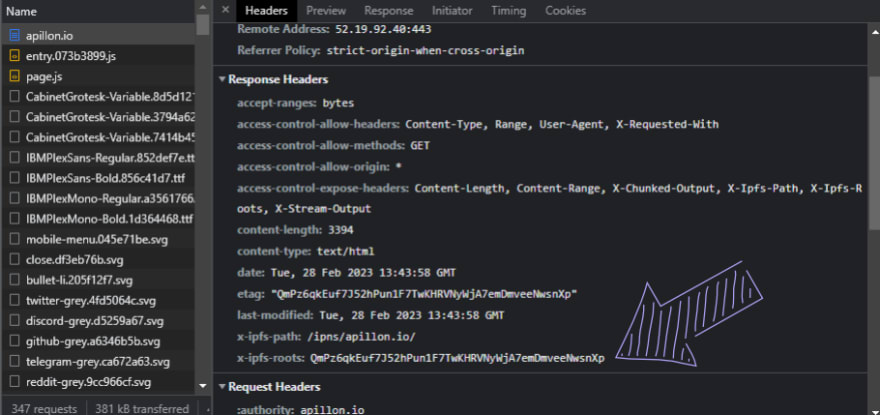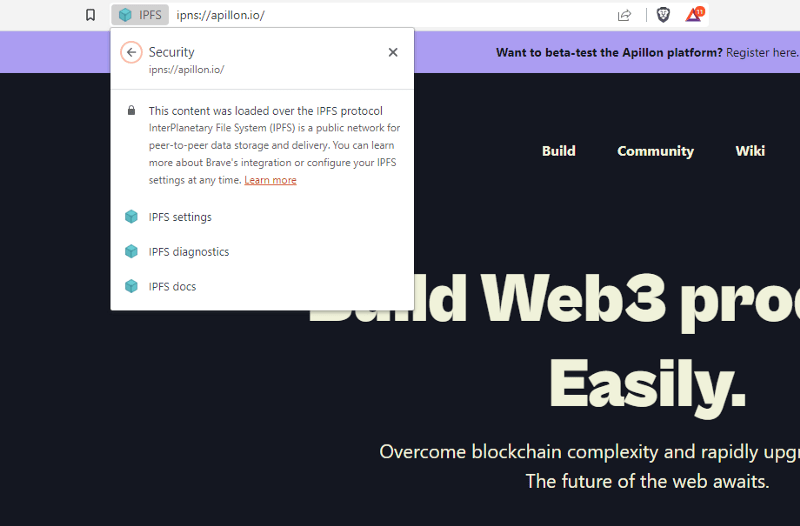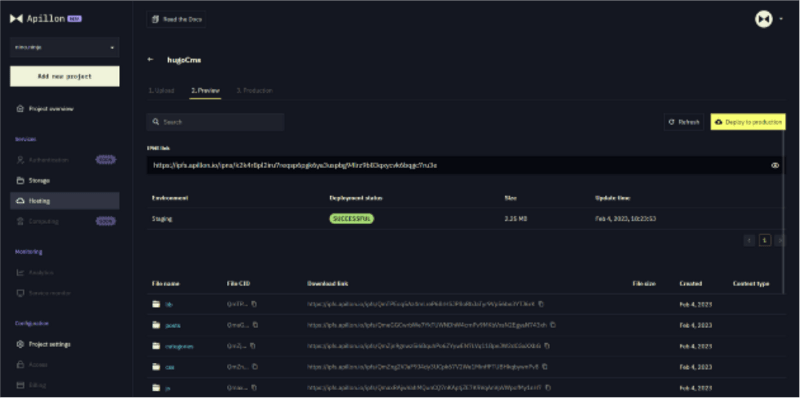True to Apillon's pursuit of utilizing decentralized features wherever deemed appropriate, we migrated the apillon.io website to Web3-based hosting.
As a Web3 service provider, it's only appropriate for Apillon to live by its values. The apillon.io website is upgraded with a fully decentralized, Web3 hosting service. And it was done for two reasons: to make the website unstoppable, and to lead by example and inspire online entities to do the same.
In this post, we explain why decentralized hosting of websites adds to the open and free internet and how easy it is to upgrade a website to Web3.
What is decentralized hosting?
Let's start with the basics. Every website consists of the following:
- web files (HTML, CSS, JavaScript, text, images, or video)
- web hosting (storage of web files on a server)
- domain name (address or the pathway that pings the address of the web server)
Decentralized or Web3-based website hosting means that web files are stored on a decentralized network of nodes rather than on a centralized, single-point-of-access (or failure) server.
In the process of migrating the apillon.io website from centralized to Web3 hosting, the following technologies were implemented.
IPFS
InterPlanetary File System (IPFS) is a peer-to-peer distributed file system that allows website entities to store their data and files on their hard drives or in the cloud.
It connects all participating computer devices with the same system files. When a website is uploaded to IPFS, its files get split into smaller chunks and cryptographically hashed, while the version of the files is synced with all participating computers worldwide. A website hosted on IPFS continues living on the network even if its creator's computer gets taken down.
Contrary to central hosting solutions, where location-based addressing from a remote server could take time, IPFS's content addressing retrieves data faster and cheaper as it pings to the closest node in the network.
Crust Network
Crust Network is a decentralized cloud storage provider in the Polkadot ecosystem. It supports multiple storage-layer protocols, including IPFS, and delivers instantly accessible on-chain storage capabilities.
One of the main functions of Crust Network is hosting service for websites or apps. It helps reduce cybersecurity risks while protecting the front end. With Crust, website or app replications are distributed globally, which ensures their stability and mitigates the risk of single-point-of-failure attacks.
As a dStorage protocol on Polkadot Network, Crust provides a native cross-chain communication pallet, further increasing a website or app's cross-chain data exchange.
Storage bucket
Storage buckets are an element of the Apillon platform that helps users manage file storage on Web3 more dynamically.
Built on the underlying Crust Network and IPFS protocol, it allows easy file upload and management in Web3-hosted websites or apps.
🔎 Learn more about storage buckets. 👉 Apillon Platform Closed Beta walk-through - Web3 Storage
Why should websites decentralize their hosting?
Storing web files on a distributed network of nodes delivers several advantages to both website owners and users.
- Multiple replications of web files on a network of thousands of participating servers ensure that a website or app remains accessible even during service outages of individual servers, guaranteeing its continuous uptime.
- With no single point of access, an individual or central authority cannot cut the access or pathway to the website.
- File storage is distributed globally and not region-based, preventing central authority from destroying the storage or manipulating a website or app's files, which protects online content against censorship.
- Thanks to data fragmentation, unauthorized parties can't access website information, increasing its security and privacy.
By cutting ties with centralized hosting providers and single points of access, Web3-hosted websites tie new strings with a global, decentralized network of storage nodes.
The backing of such a network allows websites to be unstoppable, permanently accessible, and perform better.
And apillon.io has joined the club, too.
apillon.io, a fully Web3-hosted website
The official Apillon website, apillon.io, is now hosted fully on Web3.
It was moved from AWS to the Apillon Web3 Hosting service, powered by IPFS and Crust Network.
How to see apillon.io hosted on IPFS?
You can check the Apillon domain at https://dnslink.io/ and see the DNS link pointing to IPNS.
Besides, Apillon's IPFS-based hosting is shown in web server response header. It returns the IPFS address of the folder containing the apillon.io website content (see x-ipfs-roots).
Or, if you're using Brave browser, you can see an IPFS icon in the right corner of the search field when you navigate to apillon.io.
If you click on it, you proceed to an IPFS-hosted version of the Apillon website.
Now that apillon.io is hosted decentrally on IPFS, it could be accessed from any IPFS gateway and thus unstoppable.
How we migrated apillon.io to IPFS?
Using the Apillon Web3 Hosting service, we migrated the files and contents of Apillon's static website to the decentralized network of hosting servers.
Once the contents were uploaded, all website files were pinned to the IPFS gateway in a single step. They were pushed to the staging phase, allowing us to preview the final outcome and spot bugs that needed a clean-up.
Once everything looked good, we moved the website from the staging to the production phase, where it went public and visible under the apillon.io domain.
Lastly, we linked the apillon.io domain to website contents, and configured it. To set it up for decentralized, Web3-based hosting with Apillon, the DNS records were changed accordingly.
And that's pretty much it.
Within an hour from start to finish, the Apillon website was hosted in a fully decentralized manner and thus unstoppable from outages, censorship, or other disruptors of online accessibility.
🔎 You can find out more about the process and follow it step by step to host a static website on a decentralized network with the in-depth tutorial by Apillon CMO Nino Kutnjak. 👉 Build & deploy an unstoppable blog site with Apillon Web3 Hosting
🔎 Learn more about Web3 Hosting service in Apillon Closed Beta. 👉 Apillon Platform Closed Beta walk-through - Web3 Hosting
☝ Note:️ In Apillon Closed Beta, only hosting of static websites is supported. Closed Beta delivers no guarantees related to functionalities or access and is intended for testing purposes only. Beta features also come with several limitations, which will be removed with each platform update.
Make internet unstoppable again
Taking advantage of the grand opportunities that decentralized technologies bring to online entities, creators, and users, the Apillon website's backbone now sits on the Web3 level.
But, more importantly, it demonstrates the ease of the Web3 transition to increase the accessibility and security of online contents.
Anyone can host a website or app on Web3 and help it defy third-party decision-making over its fate. The more online sites regain self-sovereignty, the faster the web collective can bring back the free and open internet.
Start simple and benefit from a decentralized exchange of data, including that powering your online presence, be it a website, app, or identity.
This article was originally posted on Apillon Medium.













Top comments (0)